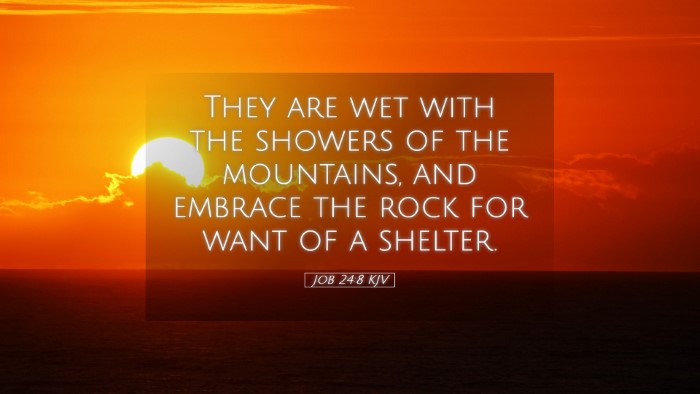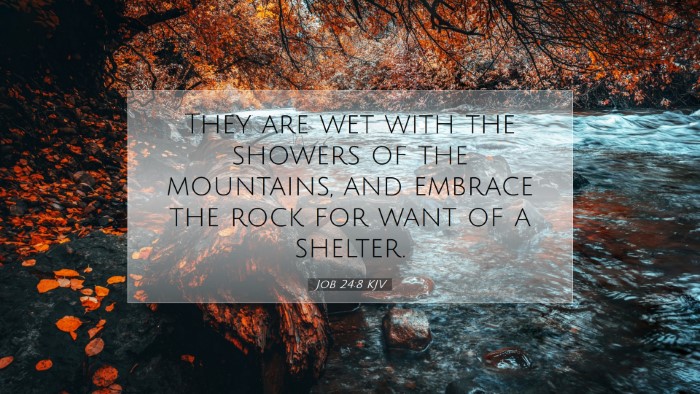Old Testament
Genesis Exodus Leviticus Numbers Deuteronomy Joshua Judges Ruth 1 Samuel 2 Samuel 1 Kings 2 Kings 1 Chronicles 2 Chronicles Ezra Nehemiah Esther Job Psalms Proverbs Ecclesiastes Song of Solomon Isaiah Jeremiah Lamentations Ezekiel Daniel Hosea Joel Amos Obadiah Jonah Micah Nahum Habakkuk Zephaniah Haggai Zechariah MalachiJob 24:8
Job 24:8 KJV
They are wet with the showers of the mountains, and embrace the rock for want of a shelter.
Job 24:8 Bible Commentary
Commentary on Job 24:8
Job 24:8 states: “They are wet with the showers of the mountains, and embrace the rock for want of a shelter.” This verse encapsulates a vivid picture of the plight of the oppressed and the unjust conditions they often face. The verse reflects the broader themes of suffering, divine justice, and the harsh realities of life.
Contextual Overview
The Book of Job addresses the profound questions of suffering and divine justice, offering a rich tapestry of dialogue between Job, his friends, and ultimately God. In chapter 24, Job is articulating the apparent prosperity of the wicked and the suffering of the innocent, highlighting the paradoxes inherent in life.
Matthew Henry's Insights
Matthew Henry emphasizes the imagery of despair conveyed in this verse. He notes:
- Desperation of the Oppressed: The reference to those being “wet with the showers of the mountains” illustrates not only physical discomfort but also the emotional turmoil of those who find themselves in dire situations, left without shelter and protection.
- Symbolism of the Rock: The image of embracing the rock suggests a search for refuge in a harsh environment, symbolizing the yearning for stability and safety amidst life's trials.
- Divine Justice on Earth: Henry reflects on the inconsistent nature of justice, questioning why the wicked seem to prosper while the righteous suffer, aligning with the fundamental themes of Job's discourse.
Albert Barnes' Perspective
Albert Barnes provides a more analytical commentary, noting:
- Wilderness Imagery: The verse serves as a microcosm of the broader human experience in a fallen world; it evokes the feelings of abandonment faced by those who are marginalized.
- Universal Application: Job's lament resonates through the ages, reminding readers that suffering is not an isolated occurrence but a shared human experience, transcending time and culture.
- Expectations of Justice: Barnes points to the expectation that God should act against the injustices prevalent in the world, and how this expectation often leads to disillusionment among the faithful.
Adam Clarke's Interpretation
Adam Clarke offers a theological viewpoint that complements the previous insights. He states:
- Dangers of Indifference: Clarke discusses the dangers associated with ignoring the plight of the downtrodden, indicating that there is a divine mandate to seek justice and mercy for all people.
- Need for Shelter: He highlights the literal and figurative need for shelter—both physical necessities and spiritual refuge are essential for the human condition.
- God’s Sovereignty: Clarke ultimately ties back to the idea that despite the apparent injustices, God's sovereignty reigns supreme and that He has a greater plan that may not always be visible to humanity.
Theological Implications
This verse thus serves as a crucial point of reflection for theologians, scholars, and students:
- Understanding Suffering: The struggle of the righteous and the seemingly unpunished wicked challenges believers to reconsider their understanding of suffering and divine order.
- Call to Action: There is a clear call for believers to be agents of justice in the world, reflecting God’s concern for the marginalized.
- Hope amidst Despair: While the verse paints a bleak picture, it also serves as a reminder of the hope and refuge found in God, encouraging prayer and reliance on divine protection.
Conclusion
Job 24:8, when examined through the lens of various commentaries, reveals profound insights into the human condition. It compels readers to confront the reality of suffering while holding onto the faith that God's justice will ultimately prevail. This verse stands as a testament to the struggle between despair and hope, underlining the crucial role of faith in navigating life's complexities.


